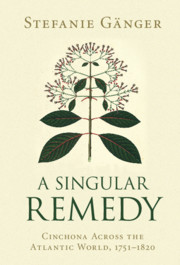Book contents
- A Singular Remedy
- SCIENCE IN HISTORY
- A Singular Remedy
- Copyright page
- Contents
- Illustrations
- Acknowledgements
- A Note on Source Material
- A Note on Language and Translation
- A Note on Weights, Currencies and Measures
- Introduction
- 1 Origin Stories
- 2 The Demands of Humanity
- 3 Community of Practice
- 4 Febrile Situations
- 5 Harvests of Change
- Conclusion
- Bibliography
- Index
3 - Community of Practice
Published online by Cambridge University Press: 02 October 2020
- A Singular Remedy
- SCIENCE IN HISTORY
- A Singular Remedy
- Copyright page
- Contents
- Illustrations
- Acknowledgements
- A Note on Source Material
- A Note on Language and Translation
- A Note on Weights, Currencies and Measures
- Introduction
- 1 Origin Stories
- 2 The Demands of Humanity
- 3 Community of Practice
- 4 Febrile Situations
- 5 Harvests of Change
- Conclusion
- Bibliography
- Index
Summary
Chapter 3 examines how medical formulae for ‘preparations of the bark’ traversed Atlantic societies over the late 1700s, and early 1800s – through practitioners’ and sufferers’ exposure to the written word, medical practice, or word of mouth. The chapter argues that methods for arranging and administering the bark had by that time coalesced into identifiable formulae – ‘bittersweet’ ‘febrifugal lemonades’, and ‘aromatic’ ‘compound wines of the bark’, most notably – that would have been familiar, and ‘agreeable’ to men and women the Atlantic World over: home-made in a Lima household, available from an Italian apothecary and popular at the Moroccan court. The chapter contends that these formulae, though they commonly exhibited structural similarities in the composition, also accommodated a measure of variability. Indeed, medical practitioners tinkered with their particulars, subtly adapting them to the sufferers’ palate, creed or means, in ways that would frequently have accounted for these preparations’ prevalence and appeal.
Keywords
- Type
- Chapter
- Information
- A Singular RemedyCinchona Across the Atlantic World, 1751–1820, pp. 91 - 119Publisher: Cambridge University PressPrint publication year: 2020

